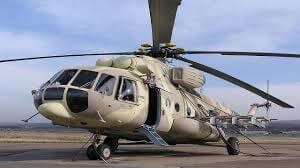The Philippine Air Force’s (PAF) plan to purchase 16 units of the heavy-lift Mil Mi-171 transport helicopters for $268.7 million from Russia has been thrown into doubt due to the threat of US sanctions. The procurement was first announced by President Rodrigo Duterte in January 2019, and forms part of his government’s efforts to modernize the nation’s defence forces.
The deal, which is expected to be formally signed soon, faces the potential threat of being sanctioned under the United States’ (US) Countering America’s Adversaries Through Sanctions Act (CAATSA), which was enacted to punish Russia for meddling in Ukraine and in the 2016 US election. In fact, Washington recently invoked the same act to place sanctions on Turkey’s acquisition of the S-400 missile system from Russia.
In response, Philippine Defense Secretary Delfin Lorenzana said, “Because of the possible sanction on procurement from Russia, the Philippine Air Force is considering [to buy] the Black Hawk helicopters,”. The Sikorsky S-70i Black Hawk combat utility helicopters are manufactured by the US and thus can serve the purpose of pacifying Washington while still enhancing the nation’s arsenal.
In furtherance of its continued efforts to diversify and modernize its forces and, Lorenzana said that the PAF was also interested in acquiring 16 more units from Poland’s PZL Mielec and that the “chances of that being fulfilled is very big”. At the same time, the Philippines is moving ahead with its purchase of attack helicopters from Turkey, the engines of which are made in the US, thus reducing the likelihood of sanctions from Washington.
Ever since Duterte took office in 2016, his foreign policy has been known to take a pro-Moscow stance. This is despite the fact that the Philippines is the largest recipient of US military assistance in the Indo-Pacific region, having received 33 billion pesos worth of planes, ships, armoured vehicles, and small arms like smart bombs since 2015. Even recently, the US gifted military equipment worth $29 million to the Philippines in an effort to boost the country’s external defence capabilities. Additionally, Washington has also made several high-level diplomatic visits to the nation over the last three months to strengthen bilateral cooperation with Manila.
In November, Duterte temporarily suspended his earlier decision to terminate the twenty-year-old Visiting Forces Agreement (VFA) with the US for a second time, as the countries worked on forming a long-term mutual defence arrangement, a decision that the White House had welcomed. This 1998 agreement provides a framework for the legal status to thousands of US troops in the Philippines for military exercises and humanitarian assistance.
Nevertheless, despite its desire to remain under the US security umbrella and maintain crucial strategic ties, there are suggestions that the risk of sanctions is not enough to deter Manila from signing the aforementioned defence deal with Moscow. Russian Ambassador Igor Khovaev has said that, as the two allies near a decision, he believes that “the outcome would be positive”.
Philippines’ Plan to Acquire Russian Helicopters Under Threat From US Sanctions
Moscow has offered 16 units of Mil Mi-171 helicopters to the Philippines, but the deal potentially invites sanctions by the US, particularly after its sanctions on Turkey for a similar deal.
December 17, 2020

SOURCE: ARMYTECHNOLOGY.COM
